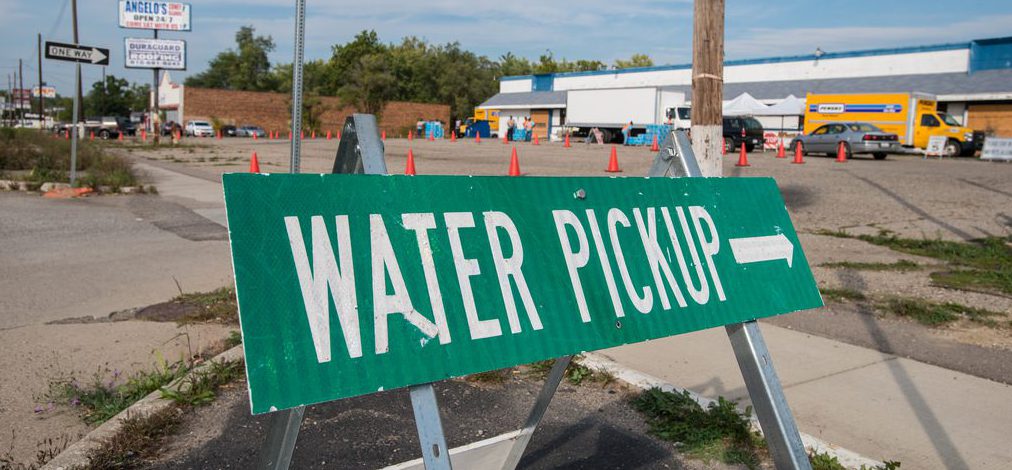5 Things You Should Know About Toxic Water Inside the United States
by Keith “Malik” Washington
14 April 2017

From the Flint Water Crisis in Michigan to the contaminated drinking water of the country’s prisons, the US government, in both its Left and Right incarnations, prizes profit and big business over the health and safety of its most vulnerable. This is what you need to know:
1. President Trump is about to make a bad situation much worse.
In his first week in office, President Trump confirmed he will ram through approval of the Dakota Access Pipeline (DAPL). The $3.8 billion pipeline, which will pass through indigenous territories, represents an attack on the Standing Rock Sioux Tribe’s sovereignty and is a threat to their water supply and way of life. Indeed, the decision to re-route the pipeline from predominantly white Bismarck, North Dakota to the Sioux Tribe’s land after residents initially complained has been described as a “ripe” example of “environmental racism.”
While the Democrats like to present themselves as the champions of the poor, they are not innocent in the politics of water protection. This was exposed by the toxic water scandal in Flint, Michigan. The lacklustre response of the Environmental Protection Agency (EPA) under the Obama administration demonstrates that neither Democrats nor Republicans have a true interest in the health, welfare and safety of poor populations.
In lieu of government, the grassroots Left have been left responsible for leading the fight against the corrupt government officials and multi-national corporations devastating America’s clean water supply.
2. The US poisons its poor.
The Governor of Michigan has denied the water crisis in Flint, Michigan is an example of environmental racism, but Madeline Stano, a staff attorney with the Centre on Race, Poverty and the Environment, rightly asks: “Would a government official take that same kind of dismissive attitude if the complaints were coming from wealthy white people in Bloomfield Hills, Michigan, or Beverley Hills, California?”
In the words of Dr Robert Bullard of Texas Southern University, “I lose my scientific reserve when it comes to environmental harm to kids like the ones in Flint. I am mad because we’re talking about the most vulnerable population in the country. And we know very well that lead poisoning causes irreversible damage. So this is a problem created by a government entity that will last not just until next year or the next election but for decades to come.”
An underrepresented, but enduring, tale of water politics in America takes place in the prison system. America has the largest prison population in the world; a population disproportionately made up of poor people. I’m incarcerated in Texas, which has one of the largest state prison systems in the US.
In 2015, I was housed at a prison called the Wallace Pack Unit in Navasota. The water was, and still is, contaminated with high levels of arsenic. Wallace Pack Unit holds prisoners who are elderly, disabled, terminally ill and poor, but none of these factors stopped Texas prison officials from lying to the public and anybody who enquired about the toxic water. They continued to lie about the situation until prisoners teamed up with the Prison Ecology Project to expose these conditions. In June 2016, after a lawsuit was brought by prisoners, Judge Keith Ellison issued an injunction ordering the prison to start providing safe drinking water.
3. If you protest or demand justice, expect police violence and jail time.
It takes articles such as this to expose the situation. Publications such as The Intercept give glimpses of the truth, but for the most part the corporate-owned media never cover stories of water contamination – and what this says about who gets access to state resources and protection – accurately.
One example of political repression faced by those who raise this endemic issue is the case of Tennie White. White is a Mississippi lab owner who was targeted by the EPA because she dared to challenge and expose the misdeeds of the Kerr-McGee Chemical Corporation. Kerr-McGee is best known for operating the nuclear power plant where Karen Silkwood was poisoned by plutonium, as portrayed in the film Silkwood. White spent her entire professional life exposing contamination, but she was particularly vocal about protecting poor black communities. EPA investigators claim White lied about lab results, andin 2013, she was sentenced to 40 months in federal prison. No-one from the Kerr-McGee Corporation has been punished with a similar sentence for the dangerous pollution at the heart of the issue.
Fast forward to the #NoDAPL protests of 2016 where police police threw a grenade at activists , nearly blowing Sophia Wilansky’s arm off. Sophia was passing out bottled water to protestors at the time.
4. Censorship and retaliation are particularly used against those who speak out on these issues from within the prison system.
Inmates who shed light on environmental injustices and abuse perpetrated against Texas prisoners have found themselves subject to all manner of punishment. Most of all, they face censorship.
The grievance process in Texas prisons is broken and corrupted. Prisoners who file complaints often find that they are “lost” or “misplaced.”This grievance program directly affects our ability to enter federal court in order to challenge un-constitutional prison conditions and abusive actions by staff. This practice of “losing” grievances is of special concern because it sabotages our right to due process. But that isn’t all – once a prisoner files a complaint in a Texas prison they become a victim of harassment and retaliation tactics by prison employees. This is a pervasive and systemic problem that has been happening for decades.
5. People are fighting back with direct action, monkey wrenching and solidarity.
In America, things are only going to get worse for those who confront corporations that are dead set on extracting and transporting noxious and volatile oil products across the US. Organized eco-defence is needed now. Dare to struggle, dare to win!